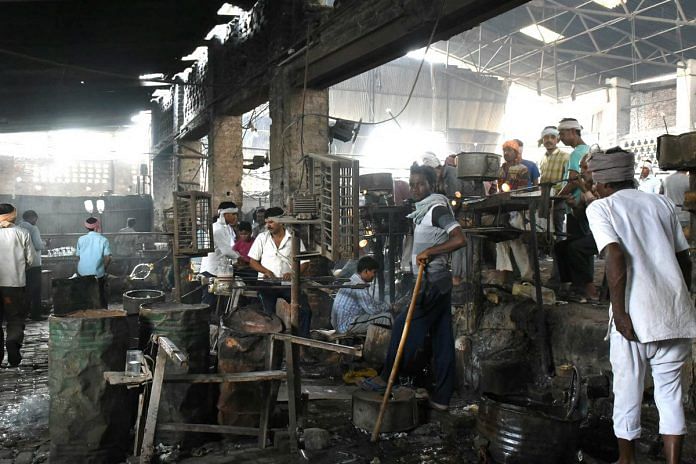The note ban affected the demand, while GST raised production costs, forcing small industry owners to fire both contracted labourers and skilled artisans.
Moradabad/Firozabad: In one of the many cramped houses in Firozabad’s tapering bylanes, Rajkaran Yadav, in his mid-fifties, focusses on colouring glass bangles a deep maroon with precision. Surrounded by three other artisans, Yadav laments the silence in the room, and says there was a time when it was chaotic and noisy, filled with workers.
Yadav has so far survived the retrenchment caused by the economic slowdown and the impact of demonetisation and the introduction of the Goods and Services Tax, but many others haven’t been so lucky.
“Earlier we had 30-35 artisans working for us. Now we barely have 15. We had to ask them to go, given our sales have dipped by 40 per cent following demonetisation and GST,” said Manish Agarwal, Yadav’s employer and owner of the family’s generations-old bangle decoration business Agarwal Choodi Ghar.
The perturbing impact of the current economic slowdown on jobs comes to the fore when employment is severely dented in labour-intensive, employment-generating industries like these. Firozabad, with its small-scale and cottage glassware industries, and Moradabad, known for its brass handicrafts, are cases in point.
In both these industries, artisans as well as unskilled labour have been badly affected.
It is difficult to estimate exactly how many people worked in these industries, or how many have lost their jobs, since they’re completely unorganised. Each factory/firm has its own set of labourers and artisans for specific functions, but the rest of the work is sub-contracted to freelance workers. And they are the ones who have borne the brunt of the slowdown.
Demand drops, production costs soar
Amit Gupta, owner of Brassco Exports in Moradabad, explains exactly how the industrialists got to this gloomy situation.
“Demonetisation meant the purchasing power of people went down, shrinking the demand. Then, GST increased our cost of production, since handicrafts are in the 18-28 per cent tax bracket. Our turnover has come down by 40 per cent,” he says.
“Thus, there has been no option but to cut down the workforce. The worst-hit are the artisans who work on a contractual basis; there is no work for them. I would say jobs have been cut by almost 50 per cent. This has been ill-managed. I am a BJP voter, but my perception has changed,” Gupta says.
Skilled aspects of the trade, like polishing, employ artisans from nearby villages who have been trained for years. However, people are now moving to colours, lacquers, and powder coating to save labour costs, since they require less skilled labour, and a fewer number of workers overall.
Raghav Agarwal, owner of Metal World in Moradabad, says he earlier operated 20 machines for polishing, with three workers deployed on each. He now operates only 10 such machines, reducing his labour needs from 60 to 30.
Gaurav Ohri, who owns Images Inc., says: “I think GST has impacted us more than demonetisation, since it increased our costs and reduced margins. Thus, the industry is cutting down costs where it can, and since we cannot cut down on material cost, it is the labour that is being impacted. Fresh recruitments are most definitely out. Of the 150 staff strength I have, I have had to let go of 20-odd.”
The mood is equally pessimistic in Firozabad’s glass industry.
Sanjay Agarwal, secretary of the UP Glass Manufacturers’ Syndicate, estimates that around 10-15 per cent of the workers have lost their jobs. These figures, however, are mere estimates, and could be much higher.
Himanshu Parashay, owner, Srinathji Glassworks, says there was no dearth of work in Firozabad because so much labour is needed to make bangles. But now, there are far more job-seekers than jobs.
Artisans losing hope
However, the bleakest future is faced by the artisans themselves, and they seem to be resigned to their fate.
Monu, who has been working as a specialist welder in Moradabad for the last four years, says: “I personally know several people who were asked to leave in the last few months. They are all sitting at home now, or trying to do some farming etc.”
Rambir, an artisan at Images Inc., hails from the nearby Khanpur village, and has worked in Moradabad for nearly 10 years. “Many jobs have been lost. If the employer’s business isn’t doing well, how will he keep his staff?” he asks.
Then, with palpable resignation, he adds: “There is nothing one can do.”
With inputs from Nayanika Chatterjee



